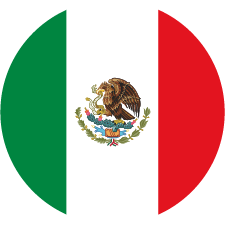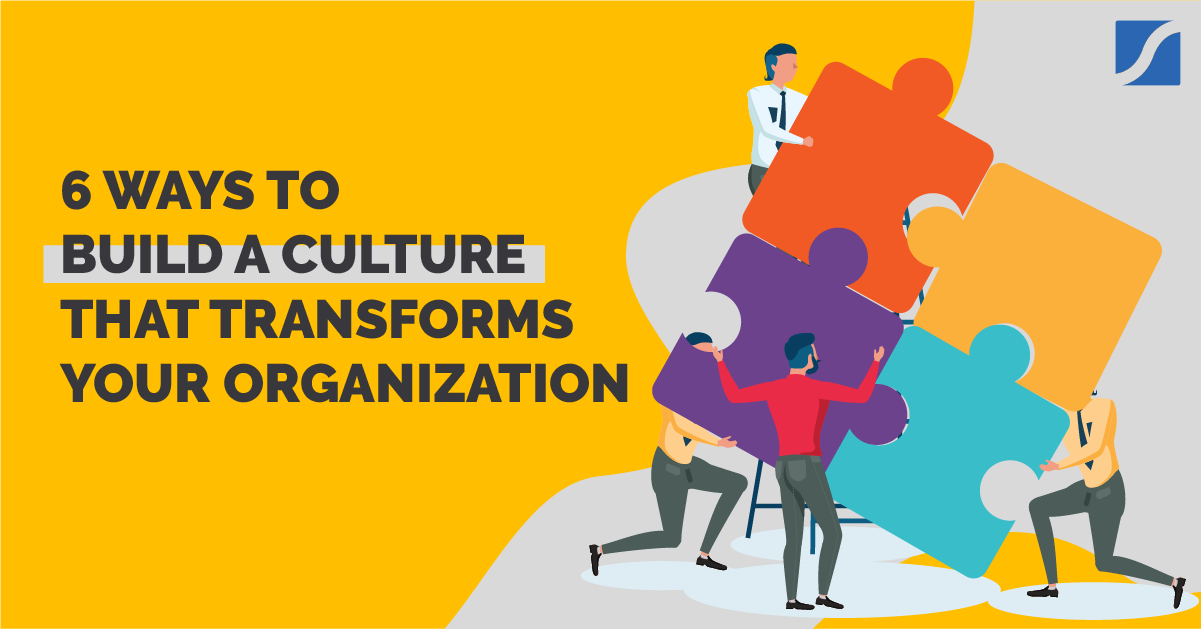14 Guidelines To Engage Every Employee In A Culture of Winning
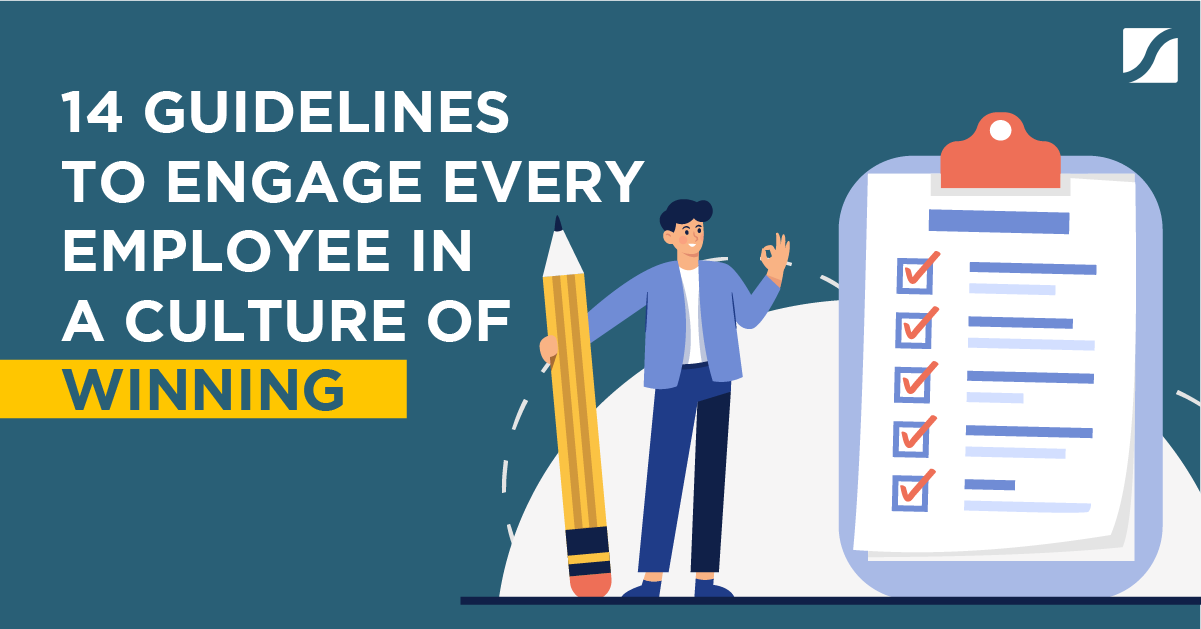
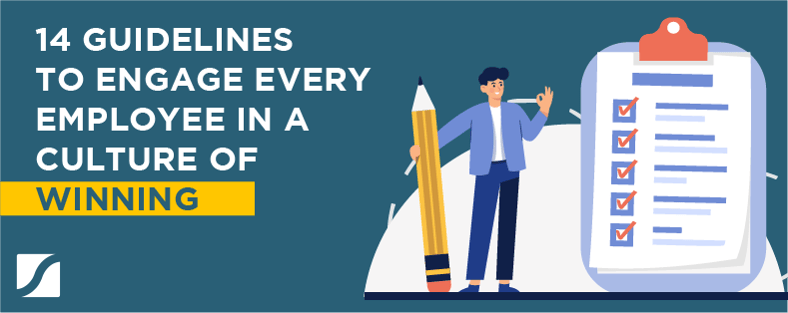
We all want the blueprint for getting employees to act like owners, grow the business, and 3x employee engagement.
Luckily, there is a powerful management system for achieving this.
It's called The Great Game of Business and for 40 years it has helped thousands of organizations empower their employees to reach their pinnacle of value.
That’s why I want to share top strategies for implementing The Great Game and how you can use it to inspire every one of your employees to take ownership of your company. What I’m sharing comes from Jack Stack (who literally wrote the book on The Great Game) and Steve Baker (VP at The Great Game of Business and one of their top coaches).
That's why we got together with them to pull out key insights about the methodology that you don’t want to forget as you implement it with your team.
What We're Covering:
#1 The Great Game Is a Time-Tested Operating System For Running Your Business
#2 One Big Idea Powers The Great Game of Business
#3 It's a "Game" For 2 Reasons
#4 You Can't Play The Game Without Acknowledging a Critical Disconnect
#5 The Great Game Is About Learning The Secret Language Of Business
#6 Three Key Principles Structure The Great Game System
#7 The Critical Number Drives The Organization
#8 Transparency and Education: The Good Outweighs The Bad
#9 It's Not Enough To Just "Open The Books"
#10 An Effective Bonus Program Has 3 Qualities
#11 The Great Game Is NOT About Making Profits
#12 The Great Game Principles Can Be Applied Globally
#13 The Great Game Is A Tremendous Asset With Scaling Up
#14 You Can Piecemeal The System - But It’s Not Recommended
#1 The Great Game Is a Time-Tested Operating System For Running Your Business
It’s a question that leaders ask themselves everyday.
“How can we compete? And how can we be one of the best and most profitable organizations out there?”
The solution comes down to unifying the organizations that we lead.
We all want the same thing. And that is get the results that we want while also creating a place where people want to come work and drive the organization forward.
That may sound like a rather large ask, but it’s already being done!
Leaders today that want to do business differently - they use The Great Game of Business.
Take the leadership at Netflix, for example.
Founder Reed Hastings and his Chief People Officer Patty McCord both have written books where they credit Jack and The Great Game for being the foundation of the Netflix culture! 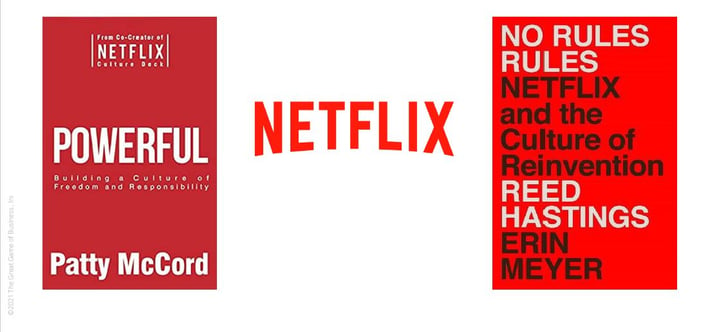
Powerful by Patty McCord and No Rules Rules by Reed Hastings
The Netflix team embraced financial transparency and literacy early on when they would get together in the parking lot and go over the company’s P&L.
They practice these habits to this day - albeit on a much larger scale. Now, anyone can sign up to receive key company financial metrics digitally.
The fact is that they wanted to create a culture of freedom and responsibility.
#2 One Big Idea Powers The Great Game of Business
In the late 70s and early 80s, Jack was sent to Springfield, Missouri to shut down the smallest division of International Harvester. It was a factory where they remanufactured the diesel engines that coming in from across the country.
When he got down there, he quickly realized something.
These people were the best in the world for what they did. And yet they were about to be shut down.
Jack was astonished. How is it possible that you can be the best and still face a layoff? It just didn’t make any sense!
Not eager to fire several hundred workers, Jack decided to buy the factory and save those jobs instead. But when he went out to get the $9 million to buy, he discovered that the bank spoke a different language.
Jack and the team managed to scrape together $100,000 down for the buyout, but 54 financial institutions still said “no”.
During this, Jack kept figuring out ways to work with the banks. He wrote new business plans and cash flow statements. All the while, he was learning their language.
Finally, a bank decided to invest. It was the worst corporate buyout in history.
As you can guess, Jack was facing immense pressure. He decided that his best chance to save the factory would be to teach his people everything that he had learned from trying to secure the financing.
And that’s the source of the major insight Jack learned and applied to The Great Game of Business methodology.
The company is the product.
Not the engines they made or the service they provided. It’s always the company. That’s really the ultimate measure of success - to build something that is growing profitably and sustainably.
So if that’s the case, why not build an education program around that? And why not build an accountability program and tie people’s incentives to that? 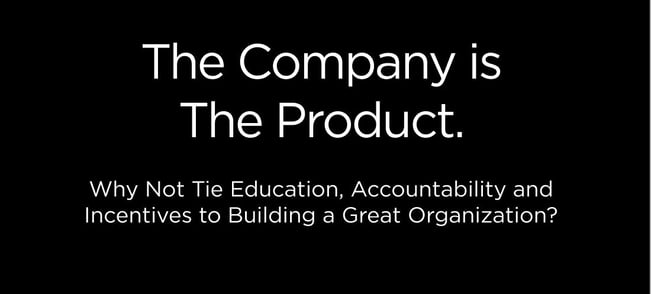 That’s the big idea that gave birth to The Great Game.
That’s the big idea that gave birth to The Great Game.
It is about trying to build a business of business people who think, act, and feel much more like the owners of a business do.
But why is it a game? There are 2 reasons for that.
#3 It’s a “Game” For 2 Reasons
The first reason comes down to a key problem with trying to educate your employees.
Great technicians resist learning about business.
Imagine going to a specialist - a doctor or a pilot or developer - and saying, “Hey, I’m going to teach you about business and accounting.”
Odds are, you would get a lot of pushback. Who gets excited about the prospect of learning accounting?
But the thing is, we’re trying to teach our people how to be businesspeople.
When Jack thought this up, he needed everybody’s head and hearts in the process. So he decided to use the analogy of the game.
The next reason is a little more obvious.
Business has all the same elements that games do.
You have teams, captains, and individual players. There’s a goal, rules, and scoreboards you use to track your progress. Finally, there is a risk to losing and a reward for winning. The fundamentals are there!
It’s evident that we’re all very competitive in business. So what if we turned that competitive juice toward the marketplace to create a culture of winning?
#4 You Can’t Play The Game Without Acknowledging A Critical Disconnect
If we’re trying to build people who think and act like owners, we have to address the main problem.
Leadership and employees don’t have the same goal.
Frontline employees worry about completely different things than those on the executive team do! The things that employees worry about are problems like:
Will I have a job? Will I get a check? Will it cash?
But where does job security come from? It comes from a growing, vibrant and profitable business. So teach your people that if you all understand what drives business success, they’ll get job security, and benefits and a real career path.
In this way, everyone is able to get on the same page and can begin to learn the same language.
#5 The Great Game Is About Everyone Learning The Secret Language of Business
That’s another major problem with teaching your people about business.
Leadership and direct reports are not speaking the same language! That’s why it’s important to stick with a universal system you can all understand and learn.
So what is the universal language of business?
It’s the financials. Every single organization is subject to this system and it is very old.
The man who popularized it was a Franciscan friar called Luca Pacioli. 
In 1494, he published a 600-plus page book that contained all of the mathematical knowledge up to that time. Within that book, he set down a treatise on double-entry bookkeeping and business.
This knowledge he laid out provides much of the foundation for the accounting systems we use today. It’s the reason he is known as the Father of Modern Accounting.
If the financials have not changed in 500 years, that’s the secret language!
It’s not rocket science and it’s certainly possible for anyone to learn it. As Dave Ramsey says, “Money flows from people who do not understand it to people who do.”
#6 3 Key Principles Structure The Great Game System
If the principles of the game are simple to understand, they should be simple to teach.
This handy Venn diagram lays out The Great Game principles simply.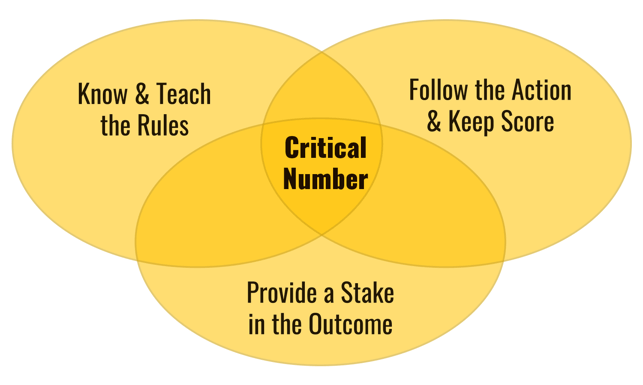
The 3 principles revolve around the Critical Number.
Everything the organization does with the 3 principles is devoted to helping us get to that number.
Know and Teach The Rules
Educating your people is critical to succeeding as a team. They need to understand the marketplace that you’re in and how you’re going to win.
Follow The Action And Keep Score
We’re not gonna play if we’re not keeping score. Otherwise, it’s just practice!
Accountability lives and breathes here. This is where you implement the Huddles and scorecards outlined in The Great Game.
Provide A Stake In The Outcome
This principle answers the question that your people will undoubtedly have, you included.
What’s in it for me? If I do all this, what do I get out of it?
Here is where you’ll tie incentives to that Critical Number with stock options and a bonus plan.
#7 The Critical Number Drives The Organization
What’s your Critical Number?
It’s all about what matters most to you as a business. You could say it’s cash or sales or profit, but it's possible to think bigger than that. When Jack implemented this, he wanted an impactful overarching number. One that would move a lot of other numbers.
When you zoom out, you can show every single department how they are connected to the Critical Number.
Understand that everybody in your organization affects the business in one way or another.
It’s just a matter of defining what that looks like. Even more, when even just one individual employee can clearly see how their contribution moves the big needle in your business, they become so much more engaged.
It’s an opportunity to see how they help the team.
This line of sight unlocks their intellectual capacity to implement a new idea, or spot an issue that no one sees, and do what it takes to make it work.
#8 Transparency and Education: The Good Outweighs The Bad
There’s a question we get when it comes to opening the books:
What if they find out what we make and they want more?
The truth is: They already want more!
In any case, don’t you want to be surrounded by people who want more? When people find out hard it is to make money in the business, they’ll be even more likely to step up and help the organization. Especially if they already have a stake in the outcome.
Another question we get is:
What if we teach them and they leave?
Here is a counterpoint.
What if they’re ignorant of how the business works and they stay? The main thing is to build an organization of people who are smart, savvy, completely unlocked and ready to contribute.
#9 It’s Not Enough To Just “Open The Books”
Open book management is just a part of what The Great Game is all about.
It’s important to be transparent about your numbers. But transparency is worthless without education. That’s why The Great Game puts them together.
Financial transparency must go hand in hand with education to work.
Your people must understand these key lessons about the business.
What does the marketplace look like? How hard is it to make money?
You want to educate your people to the point where they are taking the reins of ownership from you.
Here’s an example of that idea in action from Greene County, Missouri.
As with many counties in the U.S, they were looking at bankruptcy. So they decided to give Jack’s Great Game fundamentals a try. Being in government with all its restrictions, this was quite a challenge.
They started simple with the financial training and education. All their Huddles were held in the county building’s rotunda and, one day, the building’s janitor stepped forward and confessed something.
He had been cleaning the facilities for 20 years. In that time he had been using a clearing solution poured from barrels provided by the county.
But he had recently read a line on the barrel that he hadn’t noticed before: Dilute 7 to 1
That little change saved them $7,000 that first year.
It just goes to show that if you can bring everybody into the idea that it’s really hard to make money fast, they’ll find something you missed.
But it’s not just opening the books and hoping somebody is going to care.
It’s about people taking line item ownership of those numbers and projecting ahead by a month through consistent check-ins.
What we want is to look forward.
At Tasty Catering, a corporate catering service in Chicago, their Huddle is led by one of their chefs. Each line item owner comes prepared to the meeting with their latest earnings.
Tim Walter, their CFO, doesn’t even present a single number!
Even with The Great Game bonus program it is again about transparency and education.
Figure out and teach your people how much it costs to employ them, how much their benefits cost, etc.
Then you can put it up on a page where people can do the math themselves.
Align these short term, mid-term and long-term rewards so you can maintain that continual line of sight for your employees.
#10 An Effective Bonus Program Has 3 Qualities
It’s team-based
From the top to the bottom and reverse, everybody is on the same bonus program.
It’s self-funding
You don’t pay out a single dollar that we haven’t earned.
It’s based on gained shares
It’s not a profit share.
The Great Game helps you build a minimum performance threshold. This would be capital expenditures, technology, taxes, etc.
The idea is that this is what you need to have to build a lasting, sustainable business.
And then on top of that you add a “Gain” that adds to the bonus pool that everyone can earn.
The next part about this is important.
Put the rewards as close as possible to the behaviors that earn those rewards.
We’re talking about the Stake In The Outcome that helps to tie everyone in to the Critical Number.
The first thing everybody is going to say is “I don’t affect that area!”
Except, everybody affects the area that the organization focuses on!
Put everyone on the goal you identify and communicate that if they achieve it then everybody will get the bonuses connected to it.
And you know what everybody does? They rally together to take care of the problem and close the gap.
Every year, the organization has a different weakness. And now there is a system to take that weakness on.
Have the courage to take out the weakness.
#11 The Great Game Is NOT About Making Profits
The Great Game of Business is not about cutting costs. It is not Lean. It is not 6 Sigma.
Profits are very much an end goal to implementing The Great Game. But at the end of the day, this is about a learning experience intended to help you create leaders at all levels in the organization.
It is about teaching people about ownership and giving them the rewards.
What’s wrong with trying to run a system where you want everyone to be a leader?
Profits drive the total equity of the company. But the goal is to create wealth and distribute it as equitably as possible to the people that created it.
As you begin to teach your people how to get accountable for the money and the bottom line, that’s capital that they have more access to.
Everything that they put into the bottom line is capital that they can then use in their own life.
Prior to the 1990s nobody really shared this kind of information. It was really powerful, but it was confidential.
And the thought was, if the idea is to create something outrageously successful, why not tell everybody what it takes to be successful?
Instead of hiding these main goals and making up all these KPIs for people - with them not understanding those numbers themselves - let’s help them understand it as quickly as possible.
Otherwise it’s just so complicated!
The idea is to be able to create opportunities for people. And the interesting thing about it is that it doesn’t stop at business. It makes a difference in people’s lives. It teaches them about budgeting and debt - all those lessons which improve their own personal situations.
#12 The Great Game Principles Can Be Applied Globally
There’s always going to be changes in the marketplace.
And you have to adapt to those changes. You have to communicate those changes to your people so they understand how it affects the performance of the company.
The problem comes when you don’t explain to people in the organization what those impediments really are.
When most people don’t have the information, they think that leaders are infallible people that can solve all the problems easily.
And you know where they get the idea? From leadership!
Leaders don’t explain things to employees and don’t teach them about the problems.
So they’re left to think the leaders have got it all covered and they don’t have to worry about it.
When you teach people, they teach you. The more you teach each other, the more you learn.
So if you have a government regulation that’s standing in your way, go to the people to find the advice in order to overcome it and adapt to it.
The system is all about engagement and communications and it’s not about the top leaders solving the problems.
It’s about the top leaders telling people what kind of game they’re in and what regulations are imposed on them as they create a successful organization.
#13 The Great Game Is A Tremendous Asset With Scaling Up
You need to look at the value inside the company to ensure you have the resources to grow the top line.
People typically outrun their coverage when they look at the top-line.
The Great Game relates to Scaling Up about concentrating on the top line - but always making sure we’re negotiating on the right terms and the right principles.
We can grow successfully and we can measure that by teaching people what it takes to succeed.
That's why we created The Great Game of Business Master Business Course to complement with the rest of our programs.
The course is for everybody.
It’s just as much for new hires as it is for middle managers.
The most difficult thing is going to be selling it to middle-management.
It’s better for everybody in the organization because you’ll get better and you’ll constantly grow, and you’ll bring new people in.
The financials are not going to go away. So live with them, make them exciting and make everyone’s lives better.
#14 You Can Piecemeal The System - But It’s Not Recommended
If you start teaching people business, you start making them smart, and you open things up and ask for collaboration, and then you shut it down, what’s that going to do to trust?
There’s no rule that says you can’t play a Minigame to drive quarterly results or start up a bonus program.
But if you piecemeal it you won’t get the same level of results from doing a holistic approach.
Conclusion
When The Great Game of Business book came out it became a bestseller, not because it was rocket science.
It’s because it was so obvious.
When people picked it up, they knew it was the right thing to do for their organizations.
The thing about the financials is that they are going to be with us for a long time.
So you may as well build a system around it and teach it to your people, so they know how to win.

